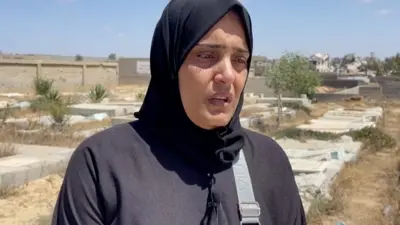We've updated our Privacy and Cookies Policy
We've made some important changes to our Privacy and Cookies Policy and we want you to know what this means for you and your data.
Julian Assange: Sweden reopens rape investigation
Swedish prosecutors have reopened an investigation into a rape allegation made against Wikileaks co-founder Julian Assange in 2010.
The inquiry has been revived at the request of the alleged victim's lawyer.
Assange, who denies the accusation, has avoided extradition to Sweden for seven years after seeking refuge at the Ecuadorean embassy in London in 2012.
The 47-year-old was evicted last month and sentenced to 50 weeks in jail for breaching his bail conditions.
He is currently being held at Belmarsh prison in London.
Why is the case being reopened?
Swedish prosecutors originally decided to drop the rape investigation two years ago, saying they felt unable to take the case forward while Assange remained holed up inside the embassy.
But on Monday, Sweden's deputy director of public prosecutions, Eva-Marie Persson, announced the case would be reopened because there was still "probable cause to suspect" that Assange had committed the alleged rape.
"Now that he has left Ecuador's embassy, the conditions in the case have changed and... the conditions are in place once again to pursue the case," she said at a news conference, adding that a European Arrest Warrant would now be issued.
His removal from the embassy, and the subsequent decision to reopen the inquiry, is likely to raise the question of which extradition request should take precedence: that of Sweden or the US.
The US is seeking Assange's extradition from the UK over his alleged role in the release of classified military and diplomatic material by Wikileaks in 2010.
Australian-born Assange faces a charge of conspiracy to commit computer intrusion in the US. He is accused of participating in one of the largest ever leaks of government secrets, which could result in a prison term of up to five years.
What happens now?
Sweden's original extradition request was made under the European Arrest Warrant (EAW) arrangements. However, it was withdrawn and so the extradition request from the US now ranks first in line. In order to displace it, Sweden's deputy director of public prosecutions said a fresh EAW request would now be issued.
If that does happen the decision as to which of the two requests take precedence will be made by UK Home Secretary Sajid Javid. He would make his decision primarily on the basis of which alleged offence was considered to be more serious.
Rape is likely to be considered more serious than conspiracy to commit computer intrusion. That would mean ordering Assange's extradition to Sweden.
Assange challenged the original Swedish request through the UK courts and could bring fresh challenges in response to a new request. These would most likely be based on human rights grounds and in particular that it would be unjust or oppressive in light of his health to extradite him.
What has the reaction been?
Wikileaks said the reopening of the rape case would give Assange "a chance to clear his name".
"There has been considerable political pressure on Sweden to reopen their investigation, but there has always been political pressure surrounding this case," its editor-in-chief, Kristinn Hrafnsson, said in a statement.
A lawyer for Assange told Swedish broadcaster SVT that the decision was "embarrassing for Sweden", adding that his client wanted to resolve the case but feared being extradited to the US.
At a separate news conference, the alleged victim's lawyer, Elisabeth Massi Fritz, said the decision to reopen the case had been "very gratifying" and that she expected this would result in a criminal charge.
Nick Vamos, former head of extradition at the Crown Prosecution Service, told Reuters news agency that the UK proceedings should not take more than 18 months.
Considering Assange's potential objections to extradition, Mr Vamos said he did not think courts would accept the US case was politically motivated.
What is the Swedish investigation about?
Assange was accused of rape by a woman and sexual assault by another one following a Wikileaks conference in Stockholm in 2010. He has always denied the allegations, saying the sex was consensual.
He also faced investigations for molestation and unlawful coercion, but these cases were dropped in 2015 because time had run out.
Prosecutors have decided to reopen the rape case before the 10-year statute of limitations expires in August 2020. The sexual assault investigation was dropped after the five-year statute of limitations expired.
Top Stories
Features & Analysis
Most read
Content is not available








